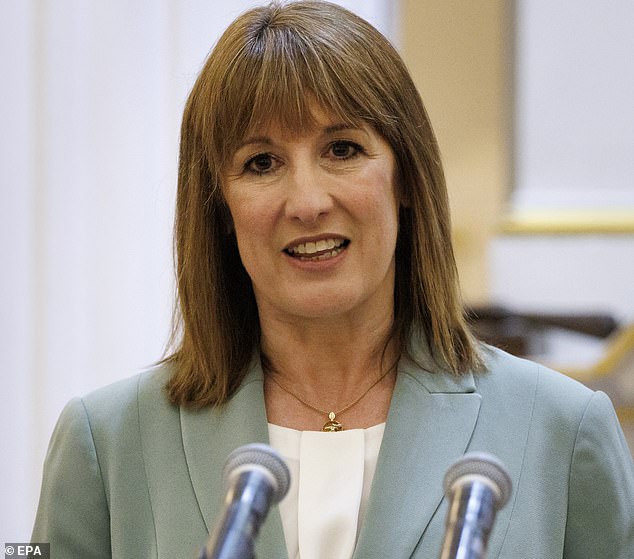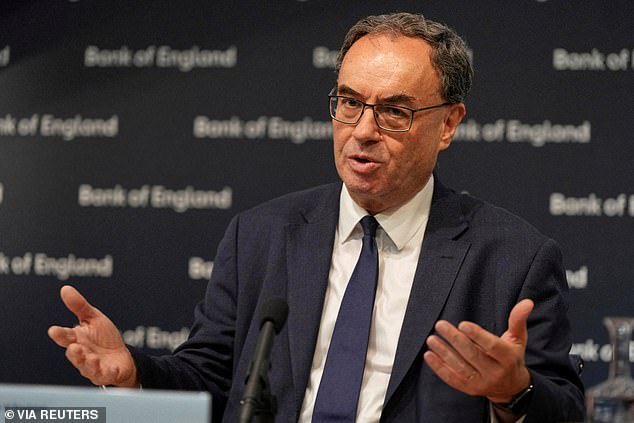Britain is drowning in debt with borrowing jumping to a five-year high, the latest figures reveal.
Rachel Reeves will now face intensifying pressure to put up taxes to deal with the spiralling cost of servicing the debt pile.
Borrowing, which makes up the shortfall between the Government’s income through tax and the amount it spends, climbed last month to a larger than expected £20.7billion.
That was the highest level for June since 2020 and £6.6billion more than a year ago.
The surge was fuelled by a sharp increase in debt interest payments, up from £8.4billion to £16.4billion.
The figures highlight the staggering cost of servicing the UK’s debt mountain, which now stands at a towering £2.87trillion. Debt interest payments are expected to surpass £110billion this financial year.
The Chancellor told a House of Lords committee hearing yesterday that the UK was ‘still very reliant on the goodwill of strangers’ who finance Britain’s debt by buying government bonds.
She added: ‘I’m a Labour politician. I don’t think there’s anything progressive about spending £100billion a year, often to US hedge funds, when I would rather spend that money on the health service or on defence or on better schools.’

Rachel Reeves will now face intensifying pressure to put up taxes to deal with the spiralling cost of servicing the debt pile
Ms Reeves said that meant she would stick to her fiscal rules, which require the Government to balance the books on day-to-day spending and target an eventual reduction in debt.
Failure to do so could mean bond investors demand even higher rates to lend to the UK. Yields have already risen since Labour came to power a year ago. Higher inflation also contributes to raise debt interest costs.
Bank of England governor Andrew Bailey told MPs in a separate parliamentary hearing that he was ‘not unconcerned’ by the rising cost of borrowing.
The dire financial situation will add up to tough decisions in Ms Reeves’ autumn Budget, when she could face filling in a financial black hole of more than £20billion in order to meet her fiscal rules.
Her predicament has been worsened after the Government caved in over welfare reforms that could have saved £5billion a year.
Tom Clougherty, from think-tank the Institute of Economic Affairs, said the borrowing figures meant tax rises were ‘inevitable’.
‘Given the country’s deepening economic malaise, high borrowing costs, and the Government’s failure to implement even minor spending cuts, it is hard to see another way out,’ he added.
Speculation is rife the Chancellor will raise money through measures such as freezing income tax thresholds – dragging millions into paying tax at higher rates – or raiding pension savings.

Bank of England governor Andrew Bailey told MPs in a separate parliamentary hearing that he was ‘not unconcerned’ by the rising cost of borrowing
Some suggest Ms Reeves could even abandon election pledges not to increase income tax, employee National Insurance or VAT.
Another option could be a hike on business taxes but that would bitterly dismay firms still reeling from the Chancellor’s £25billion hike in employer National Insurance contributions.
The employer NI hike, which took effect in April, has delivered an extra £7.5billion to Treasury coffers so far this year.
Hated inheritance tax has also brought in £2.2billion, up by more than £100million since last year.
Shadow Chancellor Sir Mel Stride said: ‘Rachel Reeves is spending money she doesn’t have. Make no mistake, working families will pay the price for Labour’s failure and costly U-turns.’
The borrowing fears add to the darkening economic picture under Labour after unemployment rose, GDP shrank for two months in a row and inflation hit 3.6 per cent, the highest level since the start of last year.
And it comes after the Office for Budget Responsibility raised fears over the state of the public finances, saying Britain ‘cannot afford the array of promises that it has made to the public’.
Ms Reeves would not commit to lowering taxes but said she wanted to reduce the tax burden by increasing GDP.
Appearing before the House of Lords economic affairs committee, she again refused to rule out a wealth tax, saying tax is ‘a matter for the Budget’.
But she called on employers to hire British workers, saying: ‘I do not think that businesses should always resort to the immigration lever to fill vacancies.’












